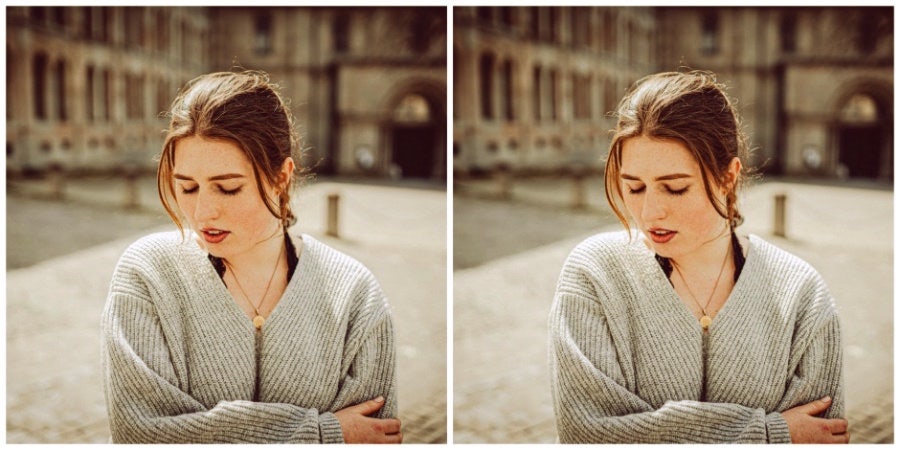Dear World: Stop Telling Young People They Can't Have Mental Health Issues
Mental illness doesn't have age limits.
 Carlos Lindner via Unsplash
Carlos Lindner via Unsplash By Gemma Hartley
“You’re not pregnant,” a stranger told me in the mall food court. I was standing with my co-worker, complaining about how the mere sight of the Panda Express signage (not to mention the swirl of smells wafting through the food court) was making my morning sickness unbearable.
I smiled politely and told him that, yes, I was indeed pregnant. Would he like to see a sonogram photo?
“I can’t believe that,” he said, still blissfully unaware of how unwelcome his commentary was. “I mean, look at you. You look like you’re thirteen! There’s no way you’re ready to have a baby.”
“Well, I’m not thirteen,” I said. I took my hot pretzel and walked back to work, trying to soothe the anger coursing around inside of me.
Comments about my age and how young I look have always grated me, but now that I was about to become a mother, they carried more than the obnoxious implication that I shouldn’t be holding a beer or seeing an R-rated film.
These comments now said, “You’re a child. You’re not ready to be a mother.” In fact, variations of that exact statement were repeated by intrusive strangers multiple times throughout my pregnancy.
Worse yet, I knew that those words were likely being spoken behind my back as well, by friends and family and those who were “concerned,” but too polite to say anything.
I wasn’t thirteen, but 22 was still far too young by most people’s standards. And plenty of people made that known.
“I can’t imagine having a baby at 22.”
“I could barely take care of myself when I was your age, let alone a baby!”
“You really have no idea what you’re in for, do you?”
“You’re so young!”
I was annoyed, but still confident that these people didn’t know my life, my experience. I felt ready to become a mother. I had wanted this pregnancy.
I had read all the baby books I was supposed to read. I had planned and prepared to the point of absurdity. I figured once the baby was born, I would prove everyone wrong.
Yet, a few weeks after adjusting into motherhood, I knew something was wrong.
My emotional state wasn’t settling to normal. I was depressed or anxious to the point that it consumed my life. I couldn’t enjoy motherhood like I knew I should.
I felt as if I was struggling to keep my head above water, but I wanted so badly to be good at motherhood that I couldn't admit it to anyone. I was crashing and burning trying to do it all, because I assumed I knew the response I would get if I admitted I was struggling with depression.
I was afraid of the stigma attached to PPD, but moreover, I was afraid that people would think I was too young to have mental health problems. I knew so many people expected me to fail.
They would write off my mental health struggle as me being too young to handle motherhood. And those words I had heard throughout my pregnancy began to fuse with my own depressed and anxious thoughts.
Maybe this is what happens when you’re too young to have kids and be a responsible mother. Maybe they were right. Maybe you’re not ready.
My internal dialogue was also shaped by the mental health stigma: I was "too young" to be depressed. I had too many good things in my life to be depressed. I needed to buck up and take care of my baby.
So I did. I never told anyone about my experience with postpartum depression until I was already coming out the other side, nearly a year after my son's birth.
I struggled and cried and hated myself through that year, and for a long time afterward. Now, I think back to the young mom I was then, and I wish I could give my younger self the love and support I so desperately needed.
I wish I had realized there was no such thing as being too young to have mental health issues. That there was nothing shameful about postpartum depression and anxiety.
My age didn’t cause it. My actions didn’t cause it. It simply happened, like illnesses do, with total disregard for the details of my life.
I wish I had known it wasn’t my fault, and that it was okay to speak up and tell people I was struggling without fearing that their doubts in my mothering ability would be confirmed. My rough days would have been a lot easier if I had felt free to talk to someone about them or seek help.
It would have been easier if I hadn’t been told, time and again, that I was “too young,” letting doubt seep in where I needed to be filled with love, with confidence, with people telling me I would do well.
I didn’t need to be reminded of my age. I needed to be reminded that I had support, no matter what.
Gemma Hartley is a writer who focuses on mental health, health and wellness, and parenting. For more of her mental health content, visit her Twitter page.

